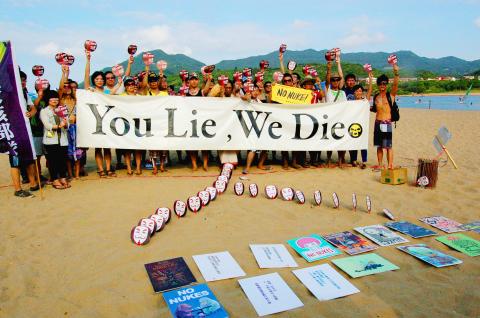With the assistance of lawyers and civic groups, several residents from New Taipei City’s (新北市) Jinshan (金山) and Wanli (萬里) districts on Friday filed an administrative appeal with the Executive Yuan, asking it to rescind the Atomic Energy Council’s (AEC) authorization last month to reactivate the Guosheng Nuclear Power Plant’s No. 1 reactor.
Environmental Jurists Association secretary-general Echo Lin (林仁惠) said 25 people, including local residents and representatives of civic groups, who all live within 30km to 40km of the nuclear plant, collectively filed the administrative appeal asking the operation at the plant to be halted.
Tsai Ya-ying (蔡雅瀅), an attorney affiliated with Wild at Heart, said the first reactor at the plant in Wanli, New Taipei City, which was built in 1973 and began operating in 1981, has been running for more than thirty years, so it is not only very old, but there have been several incidents that raised safety concerns.

Photo: Tseng Hung-ju, Taipei Times
According to a report by the AEC in June last year, the emergency circulating cooling water system is located in the basement of the plant, below the possible maximum altitude of a tsunami, Tsai said, adding that cracks were found in anchor bolts and the core shroud during a routine maintenance check in March this year.
Tsai said there are procedural defects in the AEC’s decision to allow the reactor to restart, including not holding a public hearing on the issue as stipulated in the Administrative Procedure Act (行政程序法).
It also violated conflict of interest rules by having two members of the Institute of Nuclear Energy Research, which has contracts with Taiwan Power Co, on the committee in charge of evaluating the restart, she added.
“Japan’s Fukushima Dai-ichi nuclear crisis was later found to be a preventable disaster with several crucial defects that already existed [before it was hit by a tsunami],” said Wu Huang-ching (吳磺慶), one of the volunteer lawyers. “If the Fukushima Dai-ichi nuclear plant had been stopped by legal procedure, maybe it wouldn’t have caused such a widespread disaster, so the administrative appeal is to prevent possible future disasters.”
The group expressed hope that the Executive Yuan would re-evaluate whether the plant should continue operating and whether there are defects that need to be fixed or that require it to be shut down.
“This issue is not just about us, it’s a matter that involves everyone in Taiwan,” Jinshan Anti-Nuclear Self-Help Association chairperson Hsu Fu-hsiung (許富雄) said.
Hsu added that the AEC has failed to fulfill its duty of monitoring nuclear safety and that a nuclear disaster could destroy the whole nation, so it is an unacceptable risk.

Alain Robert, known as the "French Spider-Man," praised Alex Honnold as exceptionally well-prepared after the US climber completed a free solo ascent of Taipei 101 yesterday. Robert said Honnold's ascent of the 508m-tall skyscraper in just more than one-and-a-half hours without using safety ropes or equipment was a remarkable achievement. "This is my life," he said in an interview conducted in French, adding that he liked the feeling of being "on the edge of danger." The 63-year-old Frenchman climbed Taipei 101 using ropes in December 2004, taking about four hours to reach the top. On a one-to-10 scale of difficulty, Robert said Taipei 101

Nipah virus infection is to be officially listed as a category 5 notifiable infectious disease in Taiwan in March, while clinical treatment guidelines are being formulated, the Centers for Disease Control (CDC) said yesterday. With Nipah infections being reported in other countries and considering its relatively high fatality rate, the centers on Jan. 16 announced that it would be listed as a notifiable infectious disease to bolster the nation’s systematic early warning system and increase public awareness, the CDC said. Bangladesh reported four fatal cases last year in separate districts, with three linked to raw date palm sap consumption, CDC Epidemic Intelligence

US climber Alex Honnold left Taiwan this morning a day after completing a free-solo ascent of Taipei 101, a feat that drew cheers from onlookers and gained widespread international attention. Honnold yesterday scaled the 101-story skyscraper without a rope or safety harness. The climb — the highest urban free-solo ascent ever attempted — took just more than 90 minutes and was streamed live on Netflix. It was covered by major international news outlets including CNN, the New York Times, the Guardian and the Wall Street Journal. As Honnold prepared to leave Taiwan today, he attracted a crowd when he and his wife, Sanni,

Two Taiwanese prosecutors were questioned by Chinese security personnel at their hotel during a trip to China’s Henan Province this month, the Mainland Affairs Council (MAC) said yesterday. The officers had personal information on the prosecutors, including “when they were assigned to their posts, their work locations and job titles,” MAC Deputy Minister and spokesman Liang Wen-chieh (梁文傑) said. On top of asking about their agencies and positions, the officers also questioned the prosecutors about the Cross-Strait Joint Crime-Fighting and Judicial Mutual Assistance Agreement, a pact that serves as the framework for Taiwan-China cooperation on combating crime and providing judicial assistance, Liang